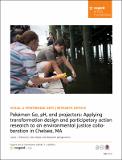| dc.contributor.author | Perovich, Laura Jones | |
| dc.contributor.author | Wylie, Sarah | |
| dc.contributor.author | Bongiovanni, Roseann | |
| dc.date.accessioned | 2020-04-28T18:56:55Z | |
| dc.date.available | 2020-04-28T18:56:55Z | |
| dc.date.issued | 2018-06-19 | |
| dc.identifier.issn | 2331-1983 | |
| dc.identifier.issn | 2331-1983 | |
| dc.identifier.uri | https://hdl.handle.net/1721.1/124905 | |
| dc.description.abstract | Abstract
Environmental issues such as climate change and toxic contamination have become a lived reality for communities globally, yet as a society we have been slow to address many of these challenges. While designers have begun partnering with interdisciplinary teams to take on large social issues, the process of design, the timescale of academic work, and the pressing needs of communities experiencing the brunt of these issues are frequently ill-aligned. In this paper, we examine a year-long exploratory collaboration between an environmental justice group in Chelsea, MA, a social scientist, and a design/technology scholar to develop approaches for studying water contamination in Chelsea’s industrialized waterway and design interventions that could lead to structural change. We expand on the benefits of a slow and processional approach to co-developing research and design questions, tie our process to a theoretical framework connecting transformation design and participatory action research and point toward other potentially valuable frameworks such as civic science. We provide practical examples that can serve as guideposts for others starting similar collaborations and discuss systems-based changes that can encourage highly interdisciplinary transformational collaborations. ©2018 Keywords: transformation design; co-production; participatory action research; community-based participatory research; environmental justice; citizen science; civic science; STS (science technology and society); advocacy; art and technology; art and environment | en_US |
| dc.publisher | Informa UK Limited | en_US |
| dc.relation.isversionof | 10.1080/23311983.2018.1483874 | en_US |
| dc.rights | Creative Commons Attribution 4.0 International license | en_US |
| dc.rights.uri | https://creativecommons.org/licenses/by/4.0/ | en_US |
| dc.source | Taylor & Francis | en_US |
| dc.title | Pokémon Go, pH, and projectors: applying transformation design and participatory action research to an environmental justice collaboration in Chelsea, MA | en_US |
| dc.type | Article | en_US |
| dc.identifier.citation | Perovich, Laura J., Sara Wylie, and Roseann Bongiovanni, "Pokémon Go, pH, and projectors: applying transformation design and participatory action research to an environmental justice collaboration in Chelsea, MA." Cogent Arts & Humanities (2018): no. 1483874 doi 10.1080/23311983.2018.1483874 ©2018 Author(s) | en_US |
| dc.contributor.department | Program in Media Arts and Sciences (Massachusetts Institute of Technology) | en_US |
| dc.contributor.department | Massachusetts Institute of Technology. Department of Biology | en_US |
| dc.relation.journal | Cogent Arts & Humanities | en_US |
| dc.eprint.version | Final published version | en_US |
| dc.type.uri | http://purl.org/eprint/type/JournalArticle | en_US |
| eprint.status | http://purl.org/eprint/status/PeerReviewed | en_US |
| dspace.date.submission | 2019-10-21T13:42:28Z | |
| mit.metadata.status | Complete | |
